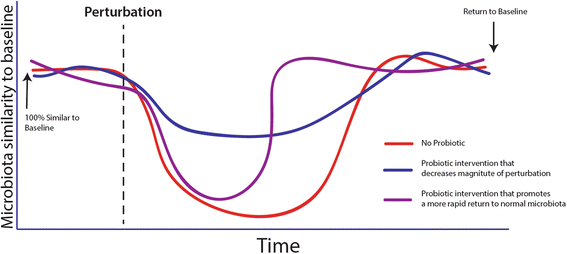Probiotics and microbiota composition
- PMID: 27250499
- PMCID: PMC4890251
- DOI: 10.1186/s12916-016-0629-z
Probiotics and microbiota composition
Abstract
Accumulated evidence, corroborated by a new systematic review by Kristensen et al. (Genome Med 8:52, 2016), suggests that probiotics do not significantly impact the fecal microbiota composition of healthy subjects. Nevertheless, physiological benefits have been associated with probiotic consumption by healthy people. Some studies have suggested that probiotics may impact the function of colonizing microbes, although this needs to be further studied. An alternative hypothesis is that probiotics may promote homeostasis of the gut microbiota, rather than change its composition. This hypothesis warrants investigation as a possible mechanism for how probiotics may benefit healthy people.Please see related article: http://genomemedicine.biomedcentral.com/articles/10.1186/s13073-016-0300-5 .
Keywords: Gut microbiota; Homeostasis; Lactobacillus; Metagenomics; Probiotic.
Figures
Comment on
-
Alterations in fecal microbiota composition by probiotic supplementation in healthy adults: a systematic review of randomized controlled trials.Genome Med. 2016 May 10;8(1):52. doi: 10.1186/s13073-016-0300-5. Genome Med. 2016. PMID: 27159972 Free PMC article.
References
-
- Goldenberg JZ, Lytvyn L, Steurich J, Parkin P, Mahant S, Johnston BC. Probiotics for the prevention of pediatric antibiotic-associated diarrhea. Cochrane Database Syst Rev. 2015;12:CD004827. - PubMed
Publication types
MeSH terms
LinkOut - more resources
Full Text Sources
Other Literature Sources
Medical


